Vol 5 No. 7 TROPIC LIGHTNING NEWS February 16, 1970
Index
Combined Forces Press On
Enemy Hiding As Supplies Dwindle
By SP4 BOB SILBERBLATT
CU CHI - Enemy units operating in the 25th Infantry Division’s area of
operations are everyday becoming more and more aware of two important factors
according to a recent division staff report. First, and due mainly to increased
combined operations between ARVN soldiers and American troops, the enemy has
learned that it just doesn’t pay to make contact.
Since the action on the slopes of Nui Ba Den in early January, during which
156 of the enemy were killed, the enemy has avoided contact with ARVN/US forces,
fighting only when he must one officer said.
He said it should now be apparent to the enemy that the supplies he has for
so long hidden in tunnels and caves throughout the area are no longer safe.
Decreased contact with the enemy has led to a substantial increase in the number
of arms and supplies caches found by combined Allied forces, he said.
The report bears this out. During the month of January alone, ARVN/US troops
uncovered 407,322 rounds of small arms ammunition. Also uncovered in January
were 415 hand grenades; 1,327 60-, 82-and 120mm mortar rounds; 167 rifle
grenades; 339 rocket-propelled grenade rounds; 158 57mm recoilless rifle rounds; 119 bangalore torpedoes and
124 107 and 122mm rockets.
Ammunition isn’t the only thing that enemy troops keep buried, hoping one day
to dig up and use against friendly forces. ARVN units working with elements of
the 25th Division also uncovered 159 small arms; eight rocket-propelled grenade
launchers; 14 crew-served M9 weapons; 12 60-and 82mm mortar tubes; 134 anti-tank
mines and 298 booby traps of various types and sizes last month.
IN ADDITION TO arms and ammunition caches uncovered, Allied forces located
301 pounds of TNT, 24,375 pounds of rice and 10,000 piasters.
Such disastrous contacts for the enemy as that of January 4-11, and the
great loss of war materiel and supplies is certainly hitting the enemy where it
hurts another officer said.
 |
THE UPS AND DOWNS OF IT - A Stinger gunship of the 116th Assault Helicopter Company flies in support of the Golden Dragons of the 2d Battalion, 14th Infantry, making living hazardous for the enemy. A Golden Dragon is partially hidden in the thick brush of the Ho Bo Woods below. (Photo by PFC Ray Bryne) |
Clearing Woods
ARVN Units Eliminate Twenty
By PFC RICK CONNELL
CU CHI - Two ARVN units working in the second Brigade’s area of operation
turned in impressive performances last month by eliminating 20 enemy in two
separate engagements.
Early last month the 2nd Company, 1st Battalion, 49th ARVN Infantry, working
with the Golden Dragons of the 2nd Battalion, 14th Infantry, in operations to
clear the Ho Bo Woods located a large, enemy-held tunnel complex.
Inside the tunnels were seven enemy, who refused a chance to Chieu Hoi.
Their resistance was short-lived however, and when the smoke cleared the seven
enemy were dead and their five AK-47’s were in the hands of the ARVN’s.
Continuing the patrol that afternoon the ARVN’s came under fire of an
estimated platoon-size enemy force. However, the ARVN’s quickly turned the
tables with their withering fire. The hasty retreat of the enemy was evidenced
in the four dead that they left behind.
Later in the month, it was an element of the 1st Squadron, 10th ARVN Cavalry,
who turned in another impressive performance by eliminating nine enemy in a one
day operation in the Boi Loi Woods.
During a morning sweep the 10th Cav located a tunnel with five stubborn enemy
inside who refused to come out. Well-placed smoke grenades, however, quickly
forced the enemy out and netted the ARVN’s five POW’s.
The afternoon half of the operation was equally successful as the ARVN’s
stopped four more of the enemy.
“We spotted an enemy element moving toward us,” said First Lieutenant
Calbraith Riley, of Brentwood, Mo., the 3rd Squadron, 4th Cavalry, advisor to
the 10th ARVN Cavalry. “There was sure a lot of firepower suddenly going out in
the direction of the enemy.”
The ARVN force caught the enemy flat-footed and a quick sweep of the area
following the contact revealed four dead.
“I was really impressed with the quick reaction of the men,” Riley said.
“But then I have learned to expect nothing but the best from these guys.”
Sweep Turns Up Two Caches
By SP4 DENNIS J. BRIES
FB DIXON - Two separate munitions caches were found within 100 meters of each
other by two companies on two consecutive days in the An Ninh Corridor about
three miles west of here. Charlie Company Triple Deuce, and Alfa Company 2/27
Wolfhounds unearthed the caches during a sweep behind the plows of a land
clearing operation.
In the first find, Alfa Company 2/27 working with the 2d Battalion (Mech),
22d Infantry uncovered the following items from a tangle of vines in the bottom
of a well: four Chicom claymores, 85 60mm mortar rounds, 108 rifle grenades, 15
3 lb blocks of C-4, 10 RPG-7 rounds with boosters, one case of 60mm mortar
fuses, one case of AK ammo, a 20 foot roll of det cord, two shovels and a can of
oil.
The next day Charlie Company 2/27 recovered the following enemy munitions
from a tunnel nearby: 15 B40 rockets, six 82mm mortar rounds, 10 cans of
detonators, 7 RPG charges, 24 Chicom grenades and one AK 47.
Rome plows were clearing woodlines and hedgerows in the corridor to permit
easier aerial reconnaissance of infiltration through the area.
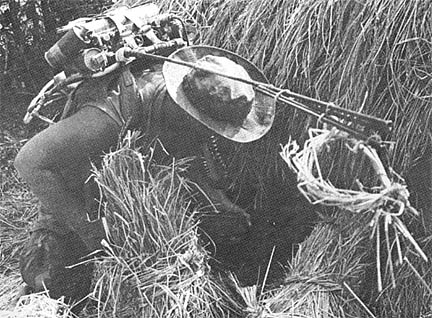 |
TAKING A LOOK-SEE - at a new hay stack for enemy hiding places is PFC Jerry Raymond from Lansing, Mich. Raymond is with the 2d Battalion, 27th Infantry Wolfhounds working with the Triple Deuce when two separate caches were found in the An Ninh Corridor. (Photo by SP4 Dennis Bries) |
VC Returns Camera
Finders Not Keepers
CU CHI - Tony Schultz “loaned” his $80 camera to a Viet Cong but he got it
back.
Specialist 4 Stanley (Tony) Schutz, St. Petersburg, Fla., was on a mission
last April with the Golden Dragons. He had his newly-purchased camera along
with him.
“It was in an ammo bag and dropped when we had to head for cover,” said
Schutz. “I figured it was gone forever.”
Recently, however, he was notified that a camera, found on a VC after a minor
battle, had been traced to him.
“It looked good on the outside,” said Tony, “but the inside had seen too many
rice paddies. “I was going to send it in to the camera company and complain
about it as a joke. But I decided it makes a good souvenir.”
Tony bought another camera to replace the damaged one. But, he said, “If the
VC want another camera they’re just going to have to buy one. I’m going home in
two weeks.”
Page 2 TROPIC LIGHTNING NEWS February 16, 1970
Decorated
| BRONZE STAR FOR HEROISM | |
| LTC James E. Coggins, HHC, 4th Bn (M), 23d Inf CPT Byron W. White, Co D, 2d Bn, 12th Inf CPT Marvin L. Tieman, Co A, 2d Bn, 34th Armor CPT Henry J. Dauphinee Jr., Co A, 2d Bn, 14th Inf 1LT Russel A. Steindam, Trp B, 3d Sqdn, 4th Cav 1LT Robert Sees, Co C, 2d Bn (M), 22d Inf 1LT Melvin A. Miller, Co C, 2d Bn, 12th Inf 1LT Kevin A. Higginson, Co A, 2d Bn, 14th Inf 2LT Robert K. Cutright, Co A, 2d Bn, 14th Inf WO1 Gary Center, Trp D, 3d Sqdn, 4th Cav CSM Willie H. Hickey, HHT, 3d Sqdn, 4th Cav CSM William M. Rommal, HHC, 3d Bn, 22d Inf 1SG Clarence D. Anderson, Trp B, 3d Sqdn, 4th Cav 1SG Julius Denning, Co A, 3d Bn, 22d Inf PSG John Park, Co A, 3d Bn, 22d Inf SSG Robert T. Cleveland, Co C, 2d Bn (M), 22d Inf SSG Joseph M. Evangelista, Co B, 4th Bn (M), 23d Inf SSG Lauren R. Boeckenhauer, Co B, 4th Bn (M), 23d Inf SSG Fred S. Jenkins, Co B, 4th Bn (M), 23d Inf SSG Rodney K. Namauu, Co C, 2d Bn, 14th Inf SGT Rickey D. Jones. Co A, 25th Avn Bn SGT George G. Little, Co D, 2d Bn, 12th Inf SGT Walter G. Hiscox, Co B, 4th Bn (M), 23d Inf SGT Thomas J. Francis, Co A, 3d Bn, 22d Inf SGT John M. Andescavage, Co A, 3d Bn, 22d Inf SGT Steve Leapley, Trp B, 3d Sqdn, 4th Cav SGT Gerron C. Morgan, Trp B, 3d Sqdn, 4th Cav SGT John G. Radvansky, Trp B, 3d Sqdn, 4th Cav SGT Dennis Sanderson, Co A, 2d Bn, 14th Inf SGT James Overbey, Co A, 2d Bn, 14th Inf |
SGT William G. Strickland, Co E, 1st Bn, 27th Inf SGT Eddie J. Demary Jr., Co B, 4th Bn (M), 23d Inf SGT Gary C. Eagleton, Co B, 4th Bn (M), 23d Inf SGT Michael H. Ikegami, Co C, 2d Bn, 14th Inf SGT Bobby Keeton, Co B, 4th Bn (M), 23d Inf SP4 William H. Kline, Co A, 3d Bn, 22d Inf SP4 Kenneth J. Marsh, Co B, 3d Bn, 22d Inf SP4 Grant W. Newton, Co A, 3d Bn, 23d Inf SP4 Rex Petri, Co A, 3d Bn, 22d Inf SP4 Joe D. Posey, Co A, 3d Bn, 22d Inf SP4 Leonard Wheeler Jr., Co A, 3d Bn, 22d Inf SP4 Campos Vincete, Co A, 3d 22d Inf SP4 Robert L. Jones, Co A, 3d Bn, 22d Inf SP4 James F. Gessner, Co A, 3d Bn, 22d Inf SP4 Arlinn Gushee, Co A, 3d Bn, 22d Inf SP4 David A. Barbareita, Co A, 25th Avn Bn SP4 Ben T. Bilbrey, Co A, 3d Bn, 22d Inf SP4 Delmar P. L’Hoste, Trp B, 3d Sqdn, 4th Cav SP4 James L. Mechel, Co C, 2d Bn (M), 33d Inf SP4 Steven Farrell, Co C, 2d Bn (M), 22d Inf SP4 David C. Finzel, Trp B, Sqdn, 4th Cav SP4 Duane S. Bellish, Trp B, 3d Sqdn, 4th Cav SP4 Michael Campor, Trp -B, 3d Sqdn, 4th Cav SP4 Arlis L. High, Co A, 2d Bn, 14th Inf SP4 James Byers, Co A, 2d Bn, 14th Inf SP4 Lawrence McDougald, Co A, 2d Bn, 14th Inf SP4 Leroy Ace, Co A, 2d Bn, 14th Inf SP4 Willie L. Wilson, Co B, 4th Bn (M), 23d Inf SP4 Teddy S. Wolfe, Co E, 2d Bn, 14th Inf SP4 Robert S. Ryken, Co A, 2d Bn, 14th Inf |
Get Away From It All
Bored? Try Special Services
If you think there’s nothing to do here in Cu Chi or Tay Ninh, you’re right.
That’s why Special Services exists - to provide you with facilities where you
can find something to do.
Take the swimming pools for instance. Waikiki East and Kona East in Cu Chi
and the Holiday Inn swimming pool in Tay Ninh were all built to help Division
troopers get away from it all. They also provide a place for short timers to
catch up on getting that nice over-all tan.
Special Services libraries offer a wide selection of books for your
enjoyment. The air-conditioned libraries have a quiet atmosphere which allows
you to sit down with a good book in peace and quiet.
The tape center is a new and welcome addition to the Cu Chi library. With 18
Wollensak tape recorders and nine sets of headphones, you can sit down with that
blank tape you bought at the PX and try your hand at recording. You will find
that you have a selection of almost 90 prerecorded, 1800 foot tapes from which
to choose. This includes popular, country and western, acid rock, Christmas,
and classical music.
An exercise room and a miniature golf course are also available from 10 a.m.
to 10 p.m. daily at Cu Chi. The exercise room, which is run by a trooper who
specializes in gymnastics, has wrestling mats, parallel bars, and enough weights
to keep the most enthusiastic weight lifter busy for a long time. The miniature
golf course, which has just been equipped with lighting for use after dark, is a
good place for enthusiasts to practice their hand at putting, too.
Of course, the Ilikai East and the Free World Service Clubs are always ready
to entertain weary soldiers. The pool tables seem to be the big attraction
there, but there is more. A reading room provides one with air-conditioned
comfort in which to read and a bookcase full of paperback books are free for the
taking.
Persons who have home movies or color slides to view may check out movie and
slide projectors, making use of the projection room. And of course the Service
Club girls always have something planned, too. Musical instruments may be
checked out from the desk if you need some practice or if you would like to get
into a jam session.
A new photo craft shop will also open at Cu Chi in the near future. And,
Golfing enthusiasts going on R&R who would like to see if they can still play a
good game, may check out a full set of golf clubs from special services to carry
with them.
So the next time you think there is nothing to do, think again. Think of
Special Services.
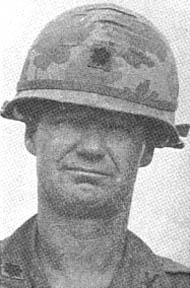 |
Lieutenant Colonel Ted G. Westerman assumed command of the 1st Battalion, (Mechanized) 5th Infantry recently. Westerman, of Chicago, Ill., succeeds Lieutenant Colonel Frederick DeLisle, now serving in Hawaii. Prior to coming to the Division, Westerman served as G-1 LISARV. |
W-2 Form: A Taxing Subject
You say you’re making all kinds of money here in Vietnam? If you want to
know just how much money you have made in the last year pick up a W-2 form so
you don’t get your finances confused.
You may pick it up at the finance office in Cu Chi any afternoon.
Vietnam veterans have 180 days following departure from Vietnam to file
Federal income tax forms. The forms are available at the Judge Advocate Office
in Cu Chi.
TROPIC LIGHTNING
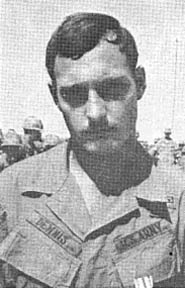 Combat Honor Roll
Combat Honor Roll
Sergeant Phillip Dennis has been added to the Tropic Lightning Honor Roll.
Sergeant Dennis distinguished himself by heroic actions on 18 and 19 December
while serving as a squad leader with Company A, 2d Battalion 22d Infantry.
While on a reconnaissance operation, elements of Alfa Company came in contact
with a large enemy force in well concealed emplacements.
During the initial contact, one man was wounded and pinned down by hostile
fire. Immediately Sergeant Dennis led his squad through the area to reinforce
the company element under fire. Arriving in the contact area, Sergeant Dennis
deployed his men into strategic positions and directed their fire on the enemy.
Sergeant Dennis spotted an enemy soldier and engaged him with small arms
fire. Simultaneously he came under fire from another hostile position, and
immediately silenced the position with a hand grenade.
As the battle progressed, Sergeant Dennis exposed himself to enemy fire as he
provided cover fire for the evacuation of the injured soldier.
On the following day his company was conducting a search of the area when
they came under intense fire from an enemy bunker. Sergeant Dennis’ accurate
fire quickly silenced the position.
For these two days of action Sergeant Dennis was also awarded the Silver
Star.
Tropic Lightning Tots
The Commanding General Welcomes
The Following Tropic Lightning Tots
To The 25th Infantry Division – As
Reported By The American Red Cross.
Born To:
| Jan. 27 SGT James Bledsee, Co D, 2d Bn, 34th Armor, boy Jan. 29 SP4 Dennis Montra, Co C, 125th Sig Bn, girl Jan. 30 SP4 Arturo Molina, Co A, 25th Avn Bn, boy |
Jan. 31 SP4 Joseph Swayne, 25th Admin Co PFC Larry D. Tudor, Co E, 1st Bn, 27th Inf, girl PFC Willis Smith, Trp B, 3 Sqdn, 4th Cav, girl Feb. 1 SSG Garland Brandon, Co B, 2d Bn, 22d Inf, boy Feb. 3 PFC Robert Stinnett, Btry B, 3d Bn, 13th Arty, girl |
The TROPIC LIGHTNING NEWS is an authorized publication of the 25th Infantry Division. It is published weekly for all division units in the Republic of Vietnam by the Information Office, 25th Infantry Division, APO San Francisco 96225. Army News Features, Army Photo Features, Armed Forces Press Service and Armed Forces News Bureau material are used. Views and opinions expressed are not necessarily those of the Department of the Army. Printed in Tokyo, Japan, by Pacific Stars and Stripes.
MG Harris W. Hollis . . . . . . . Commanding General
MAJ Warren J. Field . . . . . . Information Officer
1LT John Caspari . . . . . . . . . Officer-in-Charge
SGT John Geritti . . . . . . . . . . Editor
SP4 Charles C. Self . . . . . . . Assistant Editor
SSG Jack Anderson . . . . . . Production Supervisor
BATTALION CORRESPONDENTS
| SP4 Dennis Bries SP4 Bill Frame SGT Bill Obelholzer SP4 Jim Williams SGT Wally Baker PFC Andy Trevers SP4 Greg Stanmar SP4 Phil Jackson SP4 Pat Morrison SP5 Tony DeBiasio PFC Rich Fitzpatrick SP4 Jeff Hinman SP4 Doug Sainsbury |
2/22 4/23 4/23 2/12 2/34 1/5 2/14 2/27 3/13 2/12 1/5 2/12 2/77 |
SP4 Ken Barron SP4 Tony Crawford SP4 Greg Duncan SP4 Richard Sears SGT K.C. Cullen SP4 Dan Neff SP4 Henry Zukowski SP4 Brad Yaeger SP4 Frank Rezzonico SP4 Joe O'Rourke PFC Ray Byrne SP4 Robert Caplin SGT William E. Zarrett |
1/8 4/9 2/27 4/9 3/22 7/11 2/22 1/27 1/27 3/4 2/14 4/23 4/9 |
Page 3 TROPIC LIGHTNING NEWS February 16, 1970
Wolfhounds Warn VC
Don’t Go Near the Water
By SP4 PHIL JACKSON
FSB JACKSON - Don’t go near the water - at least if you’re a Viet Cong
planning on stashing away a munitions cache from the 2d Battalion, 27th
Infantry.
“The canals running off the Vam Co Dong River have provided the enemy with a
labyrinth of avenues,” said Bravo Company Commander Captain Frank Smith of
Columbus, Ga. “So, what we are concerned with is to deny him the use of the
waterways for transporting men and materials.”
Bravo Company of the 2d Wolfhounds, working out of Fire Support Base Jackson,
has improvised a navy of sampans to check enemy movement on the canals in the
Wolfhound area of operation.
The sampans were captured from the enemy. Equipped with mine detectors and
underwater metal detectors borrowed from the Navy, the Wolfhounds are able to
easily check the canals for hidden caches.
“On the first day out we found 23 new and neatly packed mackerel can grenades
hidden underwater along a canal bank,” said Sergeant Edward Striedl, Brooklyn,
N.Y.
“That metal detector that we borrowed from the Navy sure worked like a
charm,” said Striedl. “We also found in the same location a few Russian heat
grenades and what appeared to be a large booby trap,” said platoon leader Second
Lieutenant Richard Spencer, San Antonio, Texas, “so we blew it in place.”
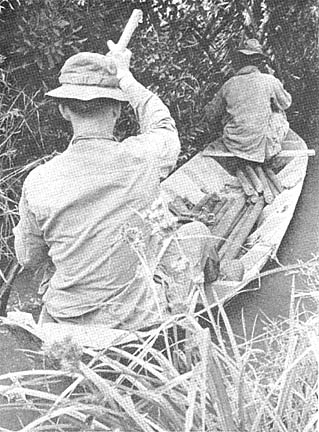 |
ARMY NAVY - Part of the Wolfhound navy moves down a narrow canal with Bangalore torpedoes to blow a boobytrap near the Vam Co Dong River. (Photo by SP4 Phil Jackson) |
Tomahawks Kill Six On Ambush Patrol
By SP4 ROBERT C. CAPLAN
TAY NINH - The element of surprise
paid off recently for the third platoon
of Charlie Company 4th Bn 23rd Inf (mechanized).
While on a night ambush patrol near FSB Hunter the Tomahawks surprised and
killed six NVA soldiers and captured one enemy weapon.
It was 1900 hours when PFC. James Ashley Jr. of Daytona Beach, Fla., first
noticed movement in the woodline to his front. The platoon had not had a chance
to set up their Claymore mines yet so Second Lieutenant Robert Szabo of Richmond
Heights, Ohio, the platoon leader, decided to let SP4 Jerry Campbell of St.
Elizabethton, Tenn, have a shot at the approaching enemy. As Campbell took aim,
Ashley noticed several NVA soldiers only 25 meters away.
“I knew they were on Campbell’s blind side” said Ashley “so I opened up on
them with my M-60 machinegun.” The remainder of the platoon also opened fire on
the enemy force which was now only 20 meters to their front.
“I’ll never forget the look of surprise on their faces when I opened up with
my M-60,” said PFC. Purcell Daniels of Philadelphia, Pa.
“The NVA put up a fight for about 20 minutes but when it got dark they took
off,” recalled PFC Steven Lee of Kenyon, Minn.
A sweep of the kill zone revealed six NVA dead and an AK-47 Rifle.
Slows Communist Supply
Bangalores Blow VC Paths
By SP4 HENRY ZUKOWSKI
PHUOC LUU - Triple Deuce tracks and men equipped with high explosives are
blowing holes into enemy infiltration routes and resupply channels in the 3d
Brigade area.
Men of Bravo Company 2nd Battalion (Mech.), 22nd Infantry along with members
of the 2/27 Wolfhounds are using thousands of Bangalore Torpedoes to remove
hedgerows and woodlines that hid enemy troops and supplies near the Cambodian
border.
SP4 Roger Heard of Bainbridge, Ga., said, “At first I began to get a little
nervous at the thought of blowing the Bangalores, but once we began it was
interesting.”
Armored personnel carriers from the Triple Deuce are used to haul the boxed
torpedoes from the local Vietnamese compound in Phuoc Luu to the designated area to be
blown. Torpedo sections are linked together and laid among the bamboo and brush
in the hedgerow to be destroyed. After the charge is properly set everybody
moves back for the big boom.
SP4 Robert Garrard of Olive Hill, Tenn., said, “I get a bang out of watching
those hedgerows going up in smoke. Those torpedoes do a job!”
As the hedgerows are destroyed the cleared land can be used by the farmer for
more food productivity. Numerous booby-traps are harmlessly detonated
preventing any danger to the men working in the area. Also many small caches of
food, arms, and ammunition, have been discovered.
Staff Sergeant John Lawinger of Mineral Point, Wis., said, “It’s easier to
destroy potential hiding places before the enemy gets dug into them than to dig
him out of the hedgerows later.”
Clan Fires 800,000th Arty Round
CU CHI - “STAND BY!” called 25th Division Assistant Commander Brigadier
General Thomas Camp Jr. A second later a 3rd Bn., 13th Field Artillery’s
800,000th artillery round was hissing toward a target near the Cambodian border.
The ceremony for the firing of the Clan’s 800,000 round took place recently
at FSB Hampton, the home base of The Clan’s firing Battery D.
The first round fired by 3/13 in Vietnam came on April 4, 1966, just two days
after the Clan arrived at Vung Tau. Round 700,000 was fired Sept. 3, 1969.
Players Score With ‘Hounds
By SP4 GREG DUNCAN
FSB JACKSON - Six professional football players, on a whirlwind hand-shaking
tour across Vietnam, paid a visit to the fire support bases of the 2nd
Wolfhounds recently.
The players, who all volunteered to come to Vietnam, included Norm Snead of
the Philadelphia Eagles, Chris Hamburger of the Washington Redskins, Len Rhode
of the San Francisco 49ers, Jim Nance of the Boston Patriots, Dan Conners of the
Oakland Raiders and Gary Garrison of the San Diego Chargers.
Asked why they volunteered to come to Vietnam, Rhode said, “We all felt that
in order to know what it was really like over here and what the guys were going
through, we had to see for ourselves firsthand.”
Although they were more than happy to answer the many questions that were
given them about their football experiences, all the players were interested in
the men and the job they were doing and had quite a few questions themselves.
After visiting three hardspots the players returned to Fire Support Base
Jackson for lunch and a ceremony where the Battalion Commander, LTC George A.
Custer, from DuPont, Wash., made them honorary Wolfhounds by presenting each one
of them a cigarette lighter with the Wolfhound crest engraved on the front.
| FOOTBALL PATRIOT - Jim Nance of the Boston Patriots tackles questions from members of Delta company, 2nd Battalion, 27th Infantry, at their compound near Phuoc Luu village. |
 |
Cu Chi Builds Defenses To Halt All Attackers
By SP4 RICHARD DOMBROWIECKI
Men in Cu Chi Base Camp are constantly rebuilding, repairing and improving
its defenses.
“Base Camp Defense (BCD) is a never-ending job which demands continual
improvement,” said Captain John S. Regan, assistant S-3 of BCD which is now
under the control of the 3d Brigade, and its commander, Colonel O. E. Smith.
The function of BCD is to defend Cu Chi Base Camp from rocket, mortar, and
ground attacks and to prevent penetration by infiltrators. New emphasis has
been placed on rebuilding bunkers, repairing faulty barbed wire and completing a
new berm line.
According to Regan, of Nashua, N.H., “Base Camp Defense is the secondary
mission of all Cu Chi military personnel. A lot of work is done every day in
refurbishing bunkers, chopping down grass and weeds, and in generally improving
positions.”
To emphasize the importance of BCD, special training is given to all bunker
guard personnel. The Tropic Lightning Academy runs a course on techniques of
challenging and on how to set up a Claymore mine.
Coordinated with BCD in its mission is artillery of the 3d Battalion, 13th
Artillery, and, in the event of ground attack, the 2d Battalion, 14th Infantry.
Division aviation is also a co-operating unit.
Page 4-5 TROPIC LIGHTNING NEWS February 16, 1970
Rough Going Everyday
Convoy to Pershing a Lifeline
Story and Photos by
SP4 JEFF HINMAN and SP4 JIM WILLIAMS
CU CHI - Transporting men, munitions, meals, and everything else necessary to
keep the 2nd Battalion, 12th Infantry operating at Fire Support Base Pershing is
the function of the Warrior Convoy.
Each day the Convoy makes the 23 mile run from Cu Chi Base Camp to FSB
Pershing.
On the road the convoy moves on file like troops in the field, and like the
field, the going is rough. In the dry season the heat and dust get to you and
in the wet season it’s the mud. But to the warriors at Fire Support Base
Pershing, the convoy is their life-line. Everyday the convoy brings them the
two vital things in their lives, mail and meals.
Vietnamese children also like to see the Warrior Convoy roll past their homes
along Highway 1 through Cu Chi and Trang Bang and up Highway 6 Alfa because the
G.I.’s always throw candy and “chop-chop” to them as they watch from the
roadside.
 |
|
Dust paves the way for the convoy to FSB Pershing |
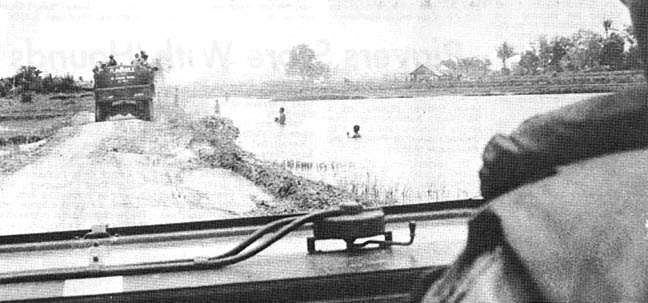 |
|
Children watch the convoy pass from their cool vantage point |
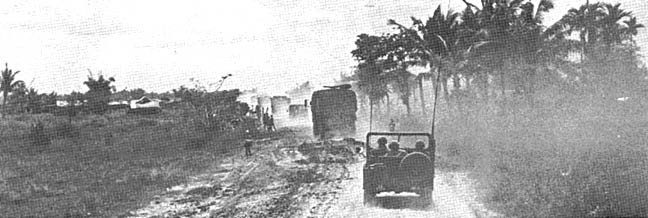 |
|
There is a long road in front of the convoy every day of the week |
| The convoy always encounters traffic - civilian and military |
 |
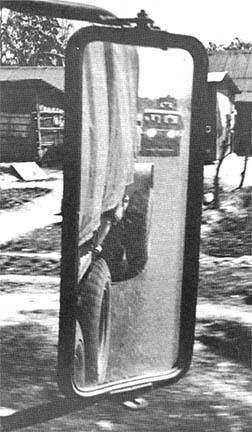 |
The convoy is on line as seen through a mirror |
| Almost lost in a “dust storm” is the last truck |
 |
 |
Rainy weather doesn’t stop the convoy |
 |
|
3/4 Cav Armor helps secure the road for the daily convoy to FSB Pershing |
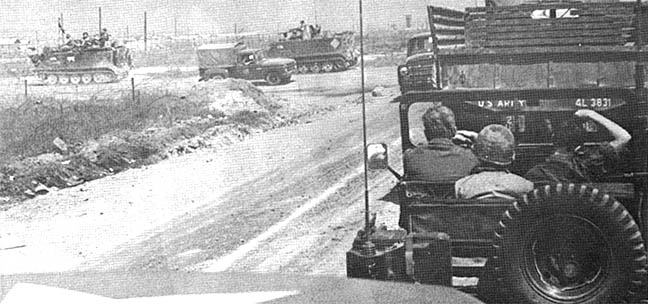 |
|
Just like stateside - A traffic jam at the gate of Cu Chi basecamp |
Page 6 TROPIC LIGHTNING NEWS February 16, 1970
 |
“LIGHT MY FIRE” - Putting his talents to work is SP6 Theodore Davis of Syracuse, N.Y. who once worked as a gourmet chef in New York City’s Hilton Hotel. He demonstrates his field-expedient barbeque grill to SP4 Robert Haredon, of Madison Heights, Mich. (Photo by SGT Rick Mizdal) |
Classes - ‘Forward Together’
FSB CHAMBERLAIN - Classes in artillery techniques for ARVN NCO’s are being
conducted here by cannoneers of Charlie Battery, 2d Battalion, 77th Artillery.
They are being conducted as part of the Dong Tien “Forward Together” program.
Three groups of eight NCOs each have completed the morning-long classes two
groups of about 15. ARVN Artillery officers have also completed the program of
instruction.
Captain John Charters, the Charlie Battery commander, said the ARVN’s seemed
to understand the classes despite the language barrier.
The classes included demonstrations of boresighting, basic periodic tests and
the use of aiming circles.
Howitzer section chiefs conducted briefings on the care and handling of
ammunition, conduct of airmobile operations and the characteristics and
nomenclature of the battery’s guns.
The All New P-38 Won’t Get Off Turf
By SP4 JEFF HINMAN
FSB PERSHING - With machine guns rattling, a deadly hail of fire strafes
enemy positions and the fighter aircraft bearing the markings of the United
States Army Air Force streaks off into the wild blue yonder.
The year is 1944. The place is the European theater of operations. The
fighter plane is a twin tailed P-38.
Years later in Vietnam, 1970, a tired and hungry 25th Infantry Division
soldier stops somewhere in the Citadel for chow. Out come the “C” rations. Out
comes a small shiny metal can opener, bearing the inscription, “U.S. Shelby
Corp.”
WHAT DOES THE World War II fighter and that small can opener so much apart of
a G.I.’s life today have in common?
Simple, both are called P-38’s. One P-38 contributed to the success in
Europe, the other is doing its part in South Vietnam.
Today’s P-38 may be a small item of equipment, but for the infantrymen in the
field its importance can’t be exaggerated. Especially when it’s time for chow.
In the hands of any G.I. the P-38 is a fast, efficient reliable tool. Next to his M-16 it’s surely
the one piece of gear he’ll never leave behind.
The P-38 is not only a G.I.’s answer to hunger pangs it also serves as a
souvenir complete with sentimental feelings of the first order. There is many
an old timer who can hold his P-38 aloft and say with pride, “Yes, this here
item of equipment has been with me since Korea.” Or, “This P-38 is in its
second tour now and like me still going strong.”
Even the new troops at the 2/12 realize the importance of the trusty P-38.
Recently one Warrior heading out of the wire on a Bushmaster operation said,
“Hey, have you got a ‘38 with you?” “Roger that,” was the reply, “I’m going
heavy duty. I’m humping two of them just in case.”
The larger size can opener known as the “church key” has gotten with the
program lately. It’s now known by the men at FSB Pershing as the B-52, the “Big
Bomber” which is also an important opener whether you live in the field or the
base camp when time for a cold beer or soda comes around.
Dragons Clothe Kids
By SP4 GREG STANMAR
TRUNG LAP - “Naked kids just don’t get it,” was the reason given for a recent
Golden Dragons clothing drive.
“I know we can’t hope to clothe everyone in our area of operation,” continued
CPT Paul O. Merryman, of New York City. “We just scratched the surface. But it
really makes you feel good when you do something like this.”
The drive, initiated by CPT Fletcher Wideman, chaplain for the 2d Battalion,
14th Infantry, was aided by clothes sent from home and contributions in money
from the men.
Thirty thousand piasters was collected. This money bought toys, clothes and
sandals. In addition, each child was given a new 20-piaster bill in keeping
with the Vietnamese Tet custom.
Other clothes from the United States was a result of solicitations by the
officers of the Dragons. After writing home, the wives contacted their
churches.
“I was surprised at the response,” said Merryman. “My church, for instance,
is really not too wealthy. Yet postage for sending the stuff came to $35.
People were more than responsive.”
By the time the battalion distributed the donations, a 21/2-ton truck was
filled.
Ask Sgt. Certain
DEAR SGT. CERTAIN: A couple of guys and
myself are going to pitch in and buy a television set for our bunker.
We’ve got one already picked out. It’s got a 3 1/2 inch screen with all
the latest gadgetry imaginable, volume control, contrast knob and everything.
What we were wondering is, if there are any good shows worth watching before we
buy the set?
N. B. And C.
DEAR NBC: It’s funny you should write about
the new shows on television this season. There are a number of good ones
out. Preventive Medicine has a great fifteen minute thriller called
“You’ve Got It Under Your Skin”. There is also an agricultural show called
“Green Rice Paddies”, starring Moms Mabley and Jackie Leonard. The
overseas network is also doing remakes of old shows. One in particular is
called “Nguyen and Bui”, a takeoff on “Ozzie and Harriet”. Only “Nguyen
and Bui” will be a comedy series. “Our Miss Van Duong” is a big hit on the
tube this year about a Vietnamese school teacher teaching motor stables to a
group of GIs. For all mess sergeants there will be a zinger of a show
called “The Beer Belly Polka” in which Sonny Tufts stars as Julia Childs and
conducts cooking classes. A series of episodes called “Mission
Impossible”, the story of one man’s efforts to check out of the PX, is big on
the bill. Local sports events will also be televised. It will
feature the pick-up football game of the week and Intermediate Night Frisbee
tournaments.
Music lovers in the division will be treated to a musical variety
show weekly called “Trang Bang Palace” with special musical groups such as
“Country Cuong and the Water Buffalo Five”, “The Lead Oxcart”, “The Rice Paddy
Water Revival”. The first show will lead off big with Kate Smith singing,
“Way Down The Vam Co Dong”, in her own inimitable style. The intellectual
crowd will be entertained with a panel show called “You Bet Your Siklo” in which
John Cameron Swasie will interview the honor Hoi Chanh of the Week. In
addition to this already outstanding season, I will portray the entire life
story of John Wayne in a two-part episode called “SGT Certain Goes To
Hollywood.”
Page 7 TROPIC LIGHTNING NEWS February 16, 1970
Two Days and Two Nights
Control, Stamina, Teamwork Combine For Bushmaster
By SP4 JIM WILLIAMS
CU CHI - A consistently successful series of Bushmaster operations requiring
control, stamina and teamwork have been held by 2d Brigade battalions during the
last several weeks.
Each Bushmaster required no less than a two day and two night period during
which a wide-range of territory was covered.
Specialist 4 Jim Williams, combat correspondent for the Warriors of 2d
Battalion, 12th Infantry, recently accompanied Bravo Company on a Bushmaster
southeast of Fire Support Base Pershing in the Citadel area.
The operation began early in the morning with a search of a village complex
near what was scheduled to be the site of the first night’s ambush positions.
As the sun began to set, Bravo Company moved to a holding area to await
darkness and receive C-rations, water, claymore mines and the day’s mail.
When total darkness enveloped their position movement to ambush sites began.
A short while later five ambushes were in position for an all-night vigil.
SHORTLY BEFORE MIDNIGHT ambush number three engaged two VC with M-16 and
machine gun fire, resulting in one enemy killed and a K-54 pistol, two hand
grenades, a pound of documents, two flashlights and 5 pounds of clothing.
A short time later Staff Sergeant Dennis Evans of Grand Rapids, Mich.,
spotted another enemy climbing over a rice paddy dike in front of a claymore
mine.
“We waited, then we blew the claymore. There wasn’t a doubt in my mind that
we got him,” Evans said. A sweep of the area under flare illumination revealed
another dead enemy.
At sunrise the weary Warriors packed up their gear and headed to another
holding area some distance away.
The new holding area was a friendly village. Bravo Company set up security,
then began thinking about the hot breakfast that would soon arrive.
Private First Class Kieth Moffit was one of the hungry Warriors waiting.
“It’s really hard to believe we’re going to be getting a hot meal soon when
we are way out here in the middle of nowhere,” he said.
NO SOONER HAD the words left Moffit’s mouth when the excited call rang out,
“Pop smoke!” In swooped a Little Bear resupply chopper loaded with a breakfast
of fresh milk and cereal, hot bacon and scrambled eggs, plus steaming coffee and
cold tomato juice.
With full stomachs, the Warriors settled down to spend the rest of the
morning and early afternoon resting and preparing for the evening’s operation.
At about 1400 the Warriors headed north to a new holding area. There they
waited for nightfall and more supplies. This time it was a Diamondhead slick
and the day’s mail came with it.
The sun was a huge ball of orange when Bravo Company began moving to their
second night’s ambush sites. Again there were five ambush positions.
AT 0130 HOURS ambush three caught 5 enemy in the open. The Warriors opened
with organic weapons. A sweep of the area resulted in finding two enemy, an
AK-47, three back packs, a pound of documents, 25 pounds of polished rice and
three pounds of medical supplies.
By morning everyone was ready for the return trip to Fire Support Base
Pershing. Thoughts of what had been accomplished now mingled with thoughts of
showers and a good rest. At 0900 the comforting sound of an eagle flight
approaching could be heard. By 1000 hours the Bravo Warriors had returned to
the Pershing wire, Bushmaster completed.
| BRAVO COMPANY DISMOUNTS CHOPPERS TO BEGIN BUSHMASTER |
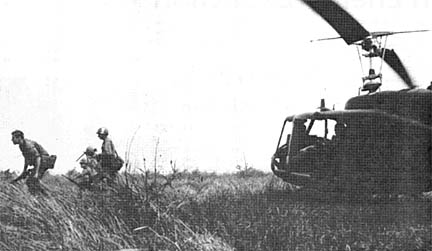 |
 |
MEDIC TAKES SHORT REST |
| GETTING READY TO RETURN TO FSB |
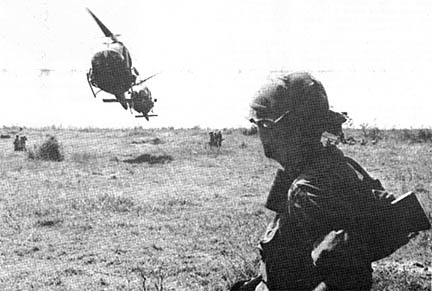 |
 |
|
WARRIORS RECEIVE FRESH SUPPLIES AFTER NIGHT AMBUSH |
Page 8 TROPIC LIGHTNING NEWS February 16, 1970
Joint U.S.-Viet Effort
VIS, MEDCAP Entertain, Heal - Bring in Hoi Chanhs
By ROBERT C. CAPLAN
LONG TRUNG - The red curtains parted and center stage the young man and woman
sang their duet accompanied by the three-piece orchestra in the wings. They were
followed by an impish comedian and, in the audience, young and old alike enjoyed
every minute of it.
This Vietnamese Information Service (VIS) show wasn’t on some elaborate stage
in Saigon but on the back of a flat bed truck in a schoolyard in the village of
Long Trung outside Tay Ninh City.
Across the street people were lined up at the back ramp of track 17. The
medic track was from Delta Company, 4th Battalion, 23rd Infantry (Mechanized).
“We’ve got a much better turnout than the last time we were here,” said Sergeant
Eugene Bihn, a medic from Millberry, Ohio.
This joint effort of the VIS and S-5 of 4/23 was aimed at increasing the
Chieu Hoi rate. The purpose of the VIS show and MEDCAP is to draw crowds to the
Chieu Hoi centers where families of known or suspected VC are given a tour of
the facilities. This lets them see for themselves that the Chieu Hoi program is
not just a propaganda story.
“The Vietnamese set up the basic program,” explained Captain Thomas Mallison
of Bear Lake, Mich., who is in charge of 4/23 S-5 operations. “Mr. Duc, who is
the head of the Phu Khu Ong district Chieu Hoi centers, sets up the programs and
supplies the culture-drama show and a speaker truck. We supply the Chieu Hoi
leaflets and Medcap Facilities.”
Chieu Hois who have gone through the program go out and talk to the
villagers. They emphasize to the families if a man rallies to the government he
can spend time with his family.
The combined program was scheduled for various hamlets throughout the Phu Khu
Ong district, which includes Tay Ninh City.
Ambushes Pay Off In Enemy Extinction
By SP4 JIM WILLIAMS
FSB PERSHING - Night ambushes by the 2nd Battalion, 12th Infantry, Warriors
resulted in the elimination of more enemy than any other battalion in the 25th
Division during the month of January.
At least one Warrior Bushmaster was harassing the enemy nearly every night
throughout the area of operations. In this way the VC and the NVA were denied
freedom of movement for troops and supplies.
As a result of the Warriors’ extensive night combat patrolling, more than 50
of the enemy were eliminated. Pound upon pound of valuable medical supplies,
clothing, food and other material also were captured by the persistent Warriors.
More importantly, nearly two dozen of the enemy’s AK-47 rifles and half as
many K-54 Chinese Communist pistols were taken out of enemy hands.
Master Sergeant Robert S. Qualls of Norwalk, Calif., part of the Warrior
Intelligence Section, usually is one of the first to know about the damage the
Warriors are inflicting on the enemy.
“We’ve all but completely cut off the enemy, said Qualls. “Food supply and
replacements from the North are no longer able to flow smoothly into the south.
Instead of traveling in large groups, they must now move in groups of three and
four.”
The enemy command structure also has suffered as a result of the continued
pressure.
“Having captured a number of high ranking VC and NVA officers,” Qualls said,
“organization within the local and regional units has deteriorated
significantly.”
Team Brings Health, Fun
By SP5 DANLEY E. DELANEY
TAY NINH - Medical care is a weekly event in Binh Trung hamlet near Tay Ninh.
First Lieutenant Charles Pruitt, 1st Brigade civic action officer, Specialist 6
Lawrence Joel, holder of the Medal of Honor and senior medic on the Medcap team,
and Private First Class Marvine L. Davis, San Antonio, Tex. Co. D, 25th Medical
Battalion visit the town once a week.
The team goes to hamlets three times a week and while an ARVN interpreter
announces their arrival over a loudspeaker, they set up their clinic in an
open-sided straw-roofed building.
As people of the village gather for treatment, Pruitt and Specialist 4 Robert
Kaufmann, Detroit, walk to the far reaches of the town passing out information
leaflets door to door.
A Vietnamese nurse helps Joel and Davis with the patients, making sure each
one knows how much medicine to take and how often.
During the treatment there is usually a treat for the children. With the aid
of an interpreter Pruitt forms a line of boys and a line of girls. The team then
passes out candy. Vietnamese children may be very brave and not cry with a cut finger, but a
stick of candy brings a giggle every time.
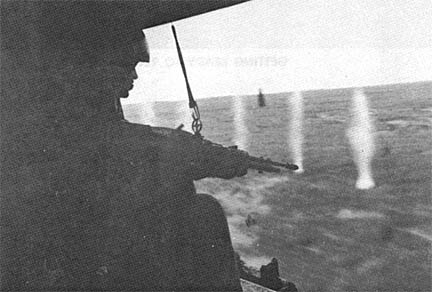 |
FOUNTAINS OF WATER - Water shoots into the air as an M-60 doorgunner fires into the swamps of a hot landing zone. The chopper was preparing to insert the 3rd Squadron, 4th Cavalry’s Mini-Cav for an operation in the Ho Bo Woods. |
From the Ground Up
Care Keeps Choppers Flying
By SP4 BOB STEPHENS
CU CHI - Helicopters are everywhere in Vietnam. Like thousands of giant
bees, they hum their way across the skies providing support for the fighting
man.
Keeping all of the choppers flying, however, isn’t an easy or often-mentioned
job. Ground crews work around the clock to insure that helicopters are safe and well
cared for.
“On an average day, we begin work at 6 a.m. and finish about 9 p.m.,” said
Specialist 4 Allen Landon of Idaho Falls, Idaho, a mechanic in the aviation
section of the 3d Brigade, 25th Infantry Division. “Many times we don’t get off
until after midnight though.”
Third Brigade’s aviation section is responsible for four Light Observation
Helicopters (LOH). The Brigade LOHs are light aircraft that fly contact
missions, courier routes and a wide variety of other flights.
According to Staff Sergeant Ernie A. Jones of Roseboro, N.C., the NCOIC for
the aviation section, “The LOH is a simple aircraft that doesn’t require a lot
of heavy repairs. But, for the safety of the pilots, all parts must be checked
and, if necessary, replaced periodically. It costs the government about $5,000
a month to keep the choppers in top shape.”
The ground crew spends most of the day on the flight line making light
repairs or cleaning parts.
“We can change a rotor blade in about 20 minutes,” explained Jones.
Ground crews clean the helicopters, change the oil and replace all faulty
safety equipment. When heavy repairs are necessary, the choppers are taken to a
large maintenance yard where they can be completely overhauled.
The most important part of the day begins at about 5 p.m. Most of the LOHs
are on their pads by that time for their daily inspection.
“A complete daily takes an hour and a half,” said Landon. “If it’s not done
right, the pilot may have to pay for it with his life.”
The craft is checked completely from the air speed indicator tube in front to
the rear rotor blade.
“The most important area to inspect is the main rotor head,” Landon pointed
out. “If something happens there, the helicopter could lose a blade and it
would go down like a rock.”
The mechanics also check the flying instruments, engine stability, structural
damage and many other things. After every 300 flying hours, helicopters go to
the maintenance yard where they are taken apart and given a complete going over.
Ground crews put in long hard days, but to the people who fly the skies of
Vietnam, it’s all worth it.
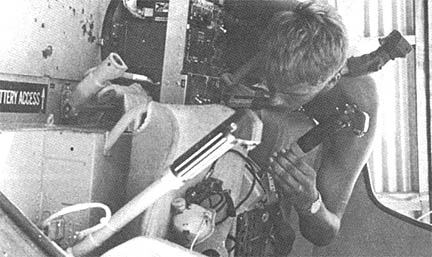 |
IS IT SAFE? - Specialist 4 Allen Landon of Idaho Falls, Idaho, looks over the pilot’s controls of a Light Observation Helicopter between missions. Landon is a mechanic in 3d Brigade’s aviation section. (Photo by SP4 Bob Stephens) |
Thanks to:
Roger Welt, 4th Bn., 23rd Inf., and a Tropic Lightning News correspondent,
for sharing this issue,
Kirk Ramsey, 2nd Bn., 14th Inf. for creating this page.
This page last modified 04-02-2006
©2006 25th Infantry Division Association. All rights reserved